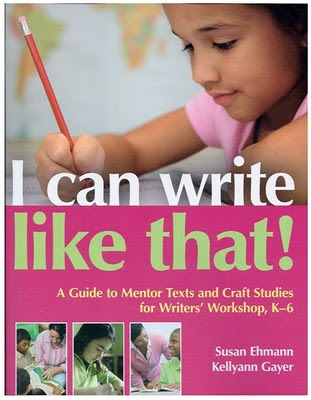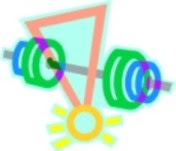If you're here at this site, you're most likely interested in teaching with picture books. You recognize that these models provide excellent examplars for word choice, idea development, story structure, and many other skills and traits.
In fact,
You know the importance of using mentor texts when teaching author's craft to your young writers. But how do you- a busy teacher with only so many hours in a day - find great mentor texts? With so many children's books available and so little time to peruse them all, matching books to writers' workshop minilessons remains a challenge.
That challenge is met in
I Can Write Like That! A Guide to Mentor Texts and Craft Studies for Writers' Workshop, K-6
, an
International Reading Association title by Susan Ehmann and Kellyann Gayer.
The excerpt above appears on the book's back cover, along with this:
In these pages you'll discover engaging fiction and nonfiction children's books and ideas for using them to their maximum potential as teaching tools. And you will find new ways to give your students a priceless gift - exemplary models for their own writing. Realize the reward of having your students listen to a well-written story then identify the author's craft and say, "I can write like that!"
Four years in the making,
I Can Write Like That! serves as an invaluable resource if you're seeking to accomplish the following:
- Build a library of mentor texts;
- Uncover all that you can teach from each book in your growing mentor library, whether it be from an old favorite or a new discovery;
- Find the perfect mentor texts to teach specific craft elements; or
- Locate age-appropriate craft studies that support your writing curriculum and further serve as models as you develop craft studies of your own. (pp. 5, 6)
I was frankly surprised to see that half the book consists of annotated lists of picture books; upon closer inspection, however, I realized that this feature makes sense. So many teachers in workshops have come to me and said, "I have so many of those books in my classroom library, but I never really knew before how to use them for instruction," or, "I want to create a core collection of really great books, but I don't even know where to start."
I began a new Young Writer's workshop this past weekend with some middle schoolers who are pretty sophisticated writers. Excited? You bet I was! These kids were ready for some serious writing work. I passed out composition books and pencils.
"We are going to keep writer's journals," I announced.
Silence. Expressionless faces.
Oops. I recognized my error. In our local school system,
journals are used to strengthen writing skills, and focus the student's attention to the subject at hand. Every single day. By middle school, they are journaling five or six times a day, as they move from classroom to classroom.
I know that teachers have specific testing goals to meet in spelling, grammar and punctuation. Creative writing?
Not so much.
I don't know how our school district fares on standardized writing tests, but I do know one side effect of daily classroom journaling; fear and loathing of "journaling."
Back to my polite little writers, whose enthusiasm I squashed in the first five minutes by using the "j" word. I backpeddled rapidly.
"OK, not really journaling," I said. "More like um...um..."
Great.
I'm the writer, and
I can't think of the right word for what I wanted them to do with those composition books.
"Blogging?" my teenage assistant suggested.
"Um...no." For one thing, there are no computers available for the workshop.
I wanted to say "diary," but that's not right either. Diaries show you just how boring your life is. A day-by-day chronicle of my life reads like the old Cheech and Chong comedy routine about "What I Did on My Summer Vacation." To paraphrase, "The first day, I got up, I got dressed, I ate breakfast. Then I went downtown to look for a job. Day two, I got up, I got dressed, I ate breakfast...."
In my childhood diaries, I wrote whatever I was thinking or feeling at the moment. Writing them comforted me. I might also add that I was an only child and didn't have to worry about a sibling digging through my inner musings.
But I digress. My Young Writers were still waiting for me to say the magic word.
"Let's notebook," I said.
Nobody flinched at my use of a noun as a verb. Encouraged, I made up some more "writerspeak." I knew I couldn't use the "p" word, either. (That would be "prompt.") Prompts leave me staring at an empty screen or page, feeling frustrated at my inability to cough up creativity on demand. But I
am good at finishing sentences...both my own and those of other people.
"Finish this sentence," I said. "Just write the first that you think of. No hard thinking allowed.
Sometimes I wonder...'"
Scribble scribble scribble. The writers finished, and looked at me for further wisdom.
"Now keep writing about that until I tell you to stop. If you can't think of anything, just keep writing 'I can't think of anything to write'. Sooner or later you will come up with something."
Yes, this is just another way of re-packaging a "free write." Say "free write" to me and watch me do a Wile E. Coyote, freezing in mid-air, just before i plummet off the creative cliff. Free writes are just a little
too "free" for me, and for most students that I encounter. There should be boundaries. That's boundaries...not walls. Less is more.
Since I do the exercises along with my students, I wrote the first thing that came to mind....I wonder what it would be like to vacation in space? From there I rambled on about a cruise ship-like space vehicle, with room service and a gift shop that sold t-shirts that said "My parents went to Saturn and all I got was this crummy t-shirt."
My workshoppers were considerably more serious. Their "wonderings" were about Big Life Issues. Just as I hoped, by the end of the allotted five minutes, they had moved from personal "wondering", to conjecture, which is the step before diving into fiction.
"Let's do another one," the group chorused. OK, maybe they didn't
chorus, but they were certainly having fun. While I never insist that anyone "share with the group" (or even with me, privately) if they don't want to, this group
wanted to. So we
shared, and did more open ended prom...um...
sentences. I've never had so much fun with a writing workshop. At least not one
I was leading!
By the end of the afternoon, each writer had several pages of raw writing, compost for future projects, and the bare bones of a short story.
And I will never have to use the "j" word again.
We are "notebooking."
Writing Workout The point of "composting" is not
just to give the writer material for future use; it helps to engage the hand and brain simultaneously. That's trickier than it sounds, since most of us are so used to writing on a computer, mindlessly adding, deleting and Spell-checking. As my students complain "My mind works faster than I can move a pencil." Ah ha! That means you have to slow down, and think while you are writing. (Thinking--that undervalued writing skill!)
Here are some of the open ended prompts I used. The second part of the part of the prompt is always "now keep writing." (Usually for five minutes, depending on the group.)
My favorite food is.... Describe without using the sense of sight.If I could invite one person to supper, famous or not, living or dead, I would invite.....(I know; this is just a variation of the "who do you admire most?' prompt, but this seems to work better, creatively speaking.)
When I was five, my favorite toy was....I really wish that... What really makes me laugh is.... The one thing I could really live without is....(or)
The one thing I can't live without is... If could be someone else for a day it would be...
I'd love to hear
your open-end prompts. (Sorry, no prize involved here. I'm just interested in hearing from
you.)
What I'm Reading.Adult Non-fiction:
Anne Frank: The Diary, the Life, the Afterlife by Francine Prose.
YA Fiction:
Purple Heart by Patricia McCormack,
Comfort by Joyce Moyer Hostetter,
Mary Ann
 My district long ago adopted writing and reading workshops championed by Lucy Caulkins and Katie Wood Ray. The cornerstone of the writing workshop is that it is grounded in personal experience. For the most part I am in total agreement with this philosophy. However, I cannot wholly commit to an idiology that would have quashed the following story arc as related to me by my 8 year old daughter:
My district long ago adopted writing and reading workshops championed by Lucy Caulkins and Katie Wood Ray. The cornerstone of the writing workshop is that it is grounded in personal experience. For the most part I am in total agreement with this philosophy. However, I cannot wholly commit to an idiology that would have quashed the following story arc as related to me by my 8 year old daughter:
Daughter: So, Jade is writing this story about a cat that is missing one leg.
Me: Really. How did the cat lose its leg?
Daughter: Well, it had this thing hung around its neck. You know, those things on the top of cans.
Me: Pause Ring pulls?
Daughter: No, you know, you use that thing and you take off the top of the can. What is that?
Me: Kinda' getting it but still thinking rationally You mean the cat has a can top hanging around its neck?
Daughter: Yeah, and it has jagged edges.
Me: Still trying to remain in the land of logic So who put it there? Its owner?
Daughter: No. The cat is a stray. It just liked the can top so wears it.
Me :Trying to imagine how a cat would punch a whole in the can lid, put it on a string and then tie a knot in it And...
Daughter: Well, the cat was walking and a car came by in the road and knocked the cat to the ground. The tin can top rolled over her body and chopped her leg off.
Me: Wow, really? That is a really interesting plot line.









Keith, thanks for visiting my blog. I think this is fabulous! What wonderful information you have on here!!!! I'll be back!
Finally a book to help us with our little ones!
janine
Thanks, Janine and Kelly.
Hope you both entered to win!
Keith, it sounds such a great book! I won't go in the competition, partly because postage to Australia is a pain, but also because I hope this book goes to a practising classroom teacher who will be inspired by it.
Mentor text or mentoring personally from adult authors can be so useful to our young writers I believe. So many of the things I taught my kids as a teacher I now know to be totally the opposite of good writing craft! So books like this make such good sense, as well as adding value to our own existing libraries. And with Skype now offering ways for us to connect with authors across the globe, woohoo!
I'm no longer teaching in a classroom, but my kids are getting into writing. My nine year old just found out about writing contests with cash prizes. This book would help me teach them about good writing.
Thanks for sharing it!
I can't get the email link to work. I think I need to change a setting on my email default or something. I might have to send you a message through WE TEACH to enter.
Michelle: I snet an email to myself with your name in it, that way you'll have the entry at Random.org when I hold the giveaway.
Thanks, Book Chook, for the visit. I agree that tech has provided some wonderul new ways to get in touch with authors.
And on the other point, I've even heard conflicting advice from authors, so it's not just us!